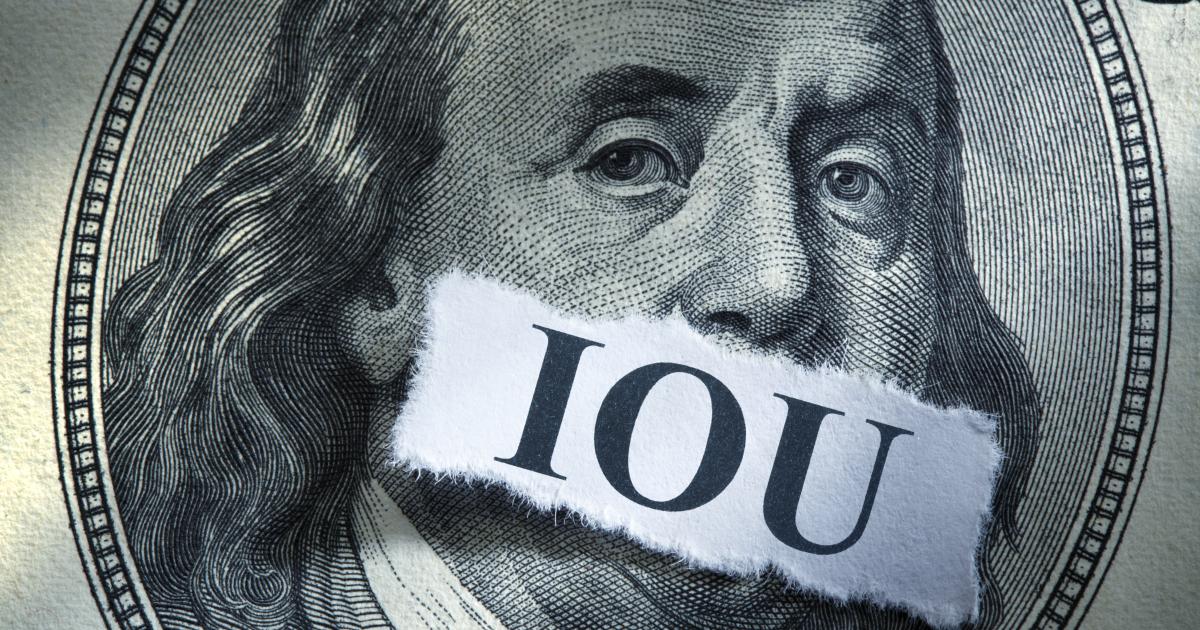Imagine being in so much credit card debt that the finance charges alone are the third-largest item in your monthly budget. That’s precisely where the federal government is today because the spendthrifts in Congress and the White House have put $34.4 trillion on the nation’s credit card.
And whether you know it or not, you’re already paying for this.
After the explosion of federal debt in the last several years, the Treasury is now paying over $1 trillion per year just to service the debt. That doesn’t pay off the debt; it just covers the interest, which exceeds how much the government spends on military programs.
In fact, interest has surpassed every line item in the Treasury’s monthly statement except for two: the Social Security Administration and the Department of Health and Human Services. But even these will be eclipsed in a few years.
This is like a family whose monthly financing charges on their credit cards exceed every other budget item except for rent and food. It’s more than their car payment, more than their water or electric bill, more than their medical bills, etc.
>>> Out-of-Control Government Spending Has Real Consequences
Even worse, the family’s monthly budget is also deeply in the red. They already cannot afford all their expenses before the credit card interest is added into the mix too; it only puts them further behind. Allocating more money each month to pay interest means increasing the amount of other expenses that must be put on the credit card, increasing the outstanding balance and future interest charges.
The family’s finances are slowly snowballing out of control. That’s the current situation with the federal debt. When I and other economists warned last year that the debt problem was getting out of hand, most in the media scoffed at those warnings. Now, the nonpartisan Congressional Budget Office agrees.
According to its projections, interest on the debt next year will grow to a new record percent of the economy. That means we’ll be spending more of our income than ever before just to service the federal debt.
The reality is even worse than the CBO predicts. Its projections include overly rosy assumptions such as inflation and interest rates both falling dramatically and quickly and no more recessions in the next 10 years. If any of those don’t hold true, then interest on the debt reaches stratospheric levels in a hurry.
This cost to service the federal debt already consumes 40% of all personal income taxes, the largest source of revenue for the government. It’s sobering to look at your pay stub and realize that 40 cents of every dollar you lose in federal income taxes is needed just to pay interest.
That’s not money for roads and bridges, hospitals and schools, or the military; it’s just interest on money that’s already been spent.
>>> American Taxpayers Are Now Slaves to Interest Payments
While people may think that this is a problem for future generations, the reality is that everyone is already footing the bill for the runaway government spending that created this mess. Through the hidden tax of inflation, your income and savings are silently being confiscated by Washington, D.C.
As the Federal Reserve creates money for the government to spend, that siphons off some of the value of all the dollars already in existence and transfers the purchasing power to the newly created money, now in the hands of bureaucrats. The lost purchasing power is a real tax, and it has cost the public about 18% of all their savings and incomes in just the last three years.
If you’re wondering why you can’t afford to buy a home, look no further than today’s record-high home prices and a mortgage interest rate that is 2 1/2 times higher than it was three years ago. Both consequences stem from the government spending too much money, and they’ve combined to increase the cost of homeownership by almost 80%.
You may not be getting a bill for the federal debt or its accompanying interest payments, but you’re certainly paying for it all.
